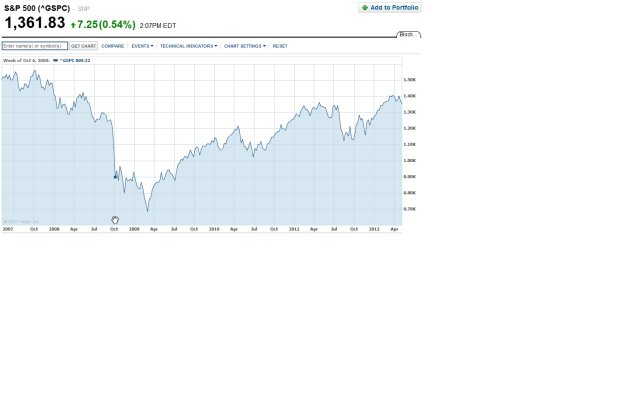Wade Pfau's reading a book by Reichenstein & Meyers: "Social Security Strategies".
Amazon.com: Social Security Strategies: How to Optimize Retirement Benefits (9780615457536): William Reichenstein, William Meyer: Books
Pfau admits that the subject is complicated, and this is coming from a guy who wrote his doctoral thesis on overhauling the system. The fun starts in chapter 4:
http://wpfau.blogspot.com/2012/05/reichenstein-and-meyers-social-security.html
IIRC, during the Great Recession one of this board's posters started SS before age 67/70 because they felt it'd help their portfolio survivability. Pfau endorses the tactic:
and finally:
I've added the book to my reading list, although I'm not particularly motivated to jump on it until I'm at least 60 years old...
Amazon.com: Social Security Strategies: How to Optimize Retirement Benefits (9780615457536): William Reichenstein, William Meyer: Books
Pfau admits that the subject is complicated, and this is coming from a guy who wrote his doctoral thesis on overhauling the system. The fun starts in chapter 4:
http://wpfau.blogspot.com/2012/05/reichenstein-and-meyers-social-security.html
And so, the objective of the book is how to strategize to get the most out of your Social Security benefits. The book is relatively straightforward through the end of Chapter 3. It covers the basics of Social Security and also how a single individual can maximize Social Security. The book does get vastly more complicated in Chapter 4, which is about couples. The problem is, for couples in which both spouses work, each spouse is potentially eligible for benefits based on their own work record (plus your spouse is also eligible for a benefit based on your record), plus a spousal benefit based on their living spouse’s work record, plus a survivor benefit based on a deceased spouse’s record.
IIRC, during the Great Recession one of this board's posters started SS before age 67/70 because they felt it'd help their portfolio survivability. Pfau endorses the tactic:
The idea being, even if you retiree at 62, you can delay starting Social Security until age 70, such that you spend down more of your financial portfolio between ages 62 and 70, and then spend from your portfolio at a lower rate after that. They show the benefit of delay using deterministic assumptions for asset returns and it is not a sure bet (a particularly bad sequence of returns around age 62 could possibly leave you better off with starting Social Security earlier) but their point is fairly persuasive. More risk averse retirees should delay claiming Social Security until later, because the longer they live, the more they will end up benefiting from the annuity properties of Social Security benefits.
and finally:
Lesson 1: For a single individual living to age 80, it does not really matter what age to begin Social Security, 62 to 70. The total lifetime benefits received will be about the same, since Social Security is meant to be “actuarially fair” with benefit reductions and increases calibrated to life expectancies. But for retirees living “well beyond” (this term is defined and discussed in the text) 80, it becomes increasingly attractive to wait until 70. This is how Social Security provides protection against the risk of outliving one’s assets.
Then, for the vastly more complicated case of couples, we get two more general lessons:
Lesson 2: For the higher earning spouse, the relevant life expectancy for the claiming decision is the life expectancy of the second spouse to die (which is higher than either spouse alone). The relevant life expectancy for the lower earning spouse is that for the first spouse to die.
And:
Lesson 3: If at least one of the spouses lives “well beyond” the age when the higher earning spouse turns 80, then the couple can usually maximize their joint lifetime benefits by having the higher earning spouse wait until 70 to claim his/her own benefits.
I've added the book to my reading list, although I'm not particularly motivated to jump on it until I'm at least 60 years old...


 ), we still would rather die with money than live without it - or taking care to maximize our income in later life, still making financial decisions that we do today without hesitation.
), we still would rather die with money than live without it - or taking care to maximize our income in later life, still making financial decisions that we do today without hesitation.